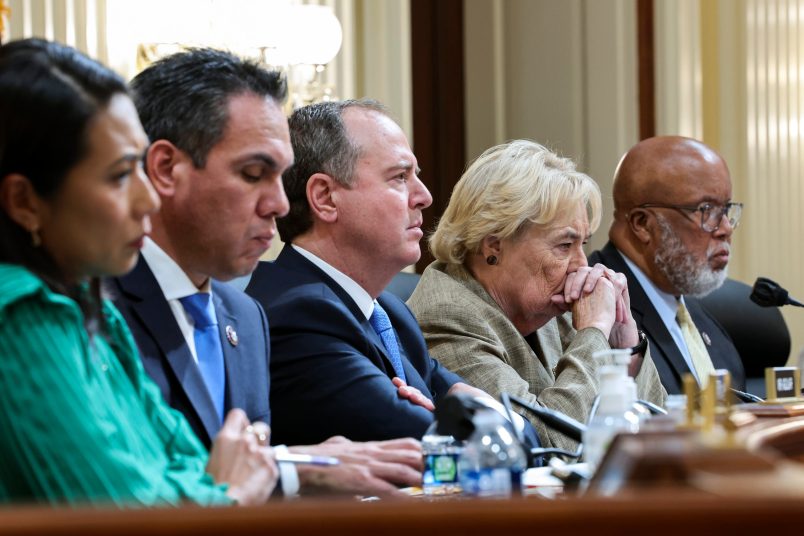The January 6 Committee laid out new details in the fake elector scheme at its Tuesday hearing, providing a look at how senior Trump officials tried to limit their own involvement in the plan while allowing it to go forward.
In November 2020, Trump was searching for a way to stay in office.
His efforts, the committee showed on Tuesday, coalesced around a plan to swear in alternate slates of pro-Trump electors in states that Joe Biden had won. GOP-controlled state legislatures could then declare the election invalid and approve the pro-Trump electors by January 6, at which point Vice President Mike Pence would reject the legitimate, Biden votes. Or that was the plan.
It’s a wild scheme, and the committee showed on Tuesday two things: that senior Trump officials knew it was insane, and possibly illegal — and that they did nothing to stop it.
The panel played a video interview with Justin Clark, a Trump campaign attorney.
Clark testified to the committee that he was uncomfortable with helping the alternate elector scheme.
Clark recalled a conversation he had with Ken Chesebro, a Trump attorney representing the campaign in Wisconsin.
“You just get after it. I’m out,” Clark recalled telling Chesebro. “I don’t think this is appropriate. This isn’t the right thing to do.”
Chesebro, released memos show, first advocated internally that the campaign take the alternate elector route, though a hodgepodge of conservative voices had also encouraged Trump to pursue that plan. The effort is now reportedly under federal investigation; Chesebro told TPM that his work fell within the realm of typical advocacy.
Testimony released by the committee suggested that Clark did nothing to stop Chesebro — he only limited his own involvement. As an attorney, Clark has continued to represent Trump. Last year, he sued the committee in a bid to stop it from obtaining records held by the National Archives that were created during the Trump administration.
Per other testimony released by the committee, the order to move the alternate elector scheme forward came from the very top: Trump himself.
RNC Chair Ronna McDaniel testified that Trump called her and connected her with attorney John Eastman, directing the two to coordinate false slates of electors.
“My understanding is the campaign did take the lead and we were just helping them,” McDaniel said.
The committee played testimony from another campaign attorney, as well: Matt Morgan.
Similarly, Morgan shifted responsibility away from himself while indicating he still allowed the plan to go forward.
“This is your task,” he recalled directing another campaign official to tell Chesebro. ” You are responsible for the Electoral College issues moving forward.”
To Morgan, that was his “way of taking that responsibility to zero.”
For the country, however, that direction appears to have helped keep the scheme alive.
The panel delved into the scheme along with testimony from two of its victims: Georgia elections worker Shaye Moss, and Speaker of Arizona’s House of Representatives Rusty Bowers.
Moss found herself the target of false election conspiracy theories propagated by Rudy Giuliani and Trump himself. Bowers was on the receiving end of intense pressure from White House officials and Trump attorneys to enact the fake elector scheme in Arizona.
But unlike Clark and Morgan, Moss and Bowers lacked the luxury of removing themselves from the situation.
“A lot of threats wishing death upon me,” recalled Moss, who is Black. “Telling me that, you know, I’ll be in jail with my mother and saying things like, ‘Be glad it’s 2020 and not 1920.'”
Bowers recalled multiple conversations with Giuliani, other Trump attorneys, and Trump himself.
“You are asking me to do something against my oath, and I will not break my oath,” he recalled telling Giuliani and Trump during a conversation about the alternate elector scheme.
Giuliani purportedly replied: “Aren’t we all Republicans here? I would think we’d get a better reception.”
The hearing did inject a new mystery into the scheme: that of Sen. Ron Johnson’s (R-WI) role.
The committee revealed a text exchange between Ron Johnson’s Chief of Staff Sean Riley and Chris Hodgson, a Pence aide.
In the texts, Riley said that Sen. Johnson wanted to give Pence “alternate slates of electors” for Wisconsin and Michigan “because archivist receive them.”
“Do not give that to him,” Hodgson replied.
It’s a piece of evidence which suggests that the plan to feed alternate electors to Pence may have had support from within the Senate.
Alexa Henning, a Johnson spokeswoman, said in a statement that the senator “had no involvement in the creation of an alternate slate of electors and had no foreknowledge that it was going to be delivered to our office.”






